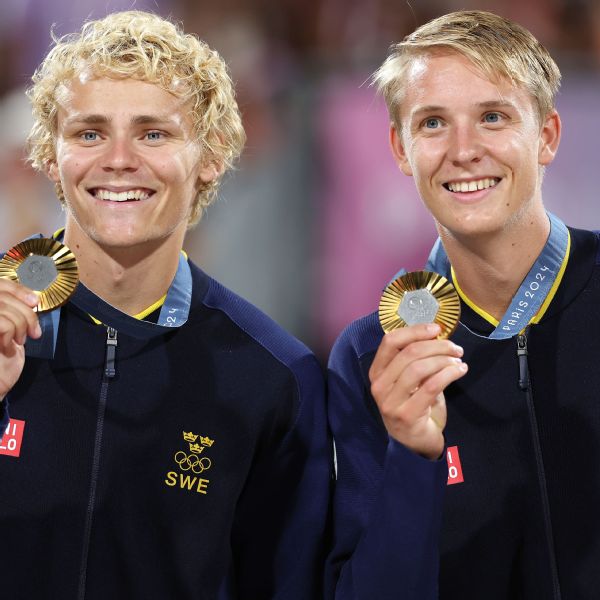
PARIS — Jump-setting Swedes David Ahman and Jonatan Hellvig aren’t the types to take their time.
The beach volleyball pioneers were the No. 1 team in the world by 22, an age when many of their competitors hadn’t even switched from the indoor game to the sand. And when Ahman and Hellvig reached the final at their first Olympics, they didn’t need long to claim the gold medal.
Sweden dispatched Germany in 36 minutes to win the men’s beach volleyball championship at the Paris Games on Saturday night, beating Nils Ehlers and Clemens Wickler 21-10, 21-13 in the final competition at the Eiffel Tower Stadium.
One night after the Brazilian women beat Canada for gold in a tense three-setter, the men’s championship was completely lacking in suspense.
“Everything just worked for us. And I still don’t believe how we managed to play that well, actually,” Hellvig said. “And then the match was just over.”
It was the second-fastest match of the men’s competition and the biggest blowout (not counting the one injury forfeit). And it came in the most important game of the Olympics.
“I would love to fight more, to have a closer match,” Wickler said. “We played many games against them – also very close. We never lost that hard against them. And on this stage, it’s very disappointing for sure.”
The quick and lopsided match gave the Swedes in the crowd of 13,000 under the twinkling lights of the iconic Parisian landmark a head start on the party.
With faces painted in yellow and blue, they waved flags and chanted in Swedish for the first Olympic beach volleyball medal in the nation’s history. When it was over, the venue DJ cranked up the ABBA and the fans sang along.
Mamma Mia, indeed.
“We wanted to do our best game of the year, right now in front of this amazing crowd, in front of so many people. And everybody’s watching,” the 6-foot-11 (2.11 meter) Ehlers said. “And I think, maybe, that’s kind of the problem.”
The Swedes used an innovative style to reach the finals of seven consecutive major international tournaments, propelling them this spring to No. 1 in the world rankings. With a “Swedish jump-set,” the player jumps to spike and passes instead – but only sometimes – forcing opponents to defend against both at the same time.
The pair struggled in the preliminary round, losing two of their three group stage matches. They needed three sets to beat Cuba in the round of 16 but never lost another set – and only trailed once, briefly, in the next three matches.
On septuple match point Saturday night, Ahman sent a second-touch kill shot into the corner for the game winner.
“When we we got the last point in, I just couldn’t believe it,” he said. “Like, looking over at the scoreboard like, ‘Oh, we we just won. What happened?'”
The silver is Germany’s first beach volleyball medal since the country swept the men’s and women’s golds at the 2012 London Games.
“The moment we got the medal around our neck, it feels amazing. And even the next moment we remember what we’ve done in the final and feel sad again. So it’s an up and down,” Ehlers said. “I think it needs more time to realize and to appreciate more what we’ve done the last two weeks.”
Wickler was only one in the match with previous Olympic experience, finishing fifth in Tokyo. The same year, Ahman and Hellvig won a world championship – the under-21 world championship.
“The last few years, our development and improvements as a team has been so fast,” Hellvig said. “We don’t really know how we did it, but it just feels amazing.”
Earlier Saturday, Norway won 21-13, 21-16 over Cherif Younousse and Ahmed Tijan, who won the bronze medal in Tokyo. It was the second medal-winning Olympics in a row for Anders Mol and Christian Sorum and a proud medal haul for Scandinavian countries known more for snow than sand.
In the women’s bracket, Brazil won gold one Olympiad after the sport’s spiritual home was shut out for the first time since beach volleyball was added to the Summer Games in 1996. No such luck for the Americans, who won seven of the first 12 gold medals on the sand: They were shut out for the first time in history.
